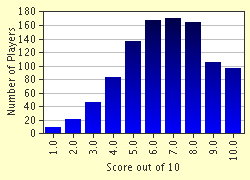Quiz Answer Key and Fun Facts
1. Already at the very beginning of the history of Rome there is plundering, pillage and rape by Romulus and his companions. Of which neighbouring tribe did he 'steal' the eligible females?
2. One of the great generals of Ancient Rome was undoubtedly Gaius Julius Caesar. To which battle against his ex-ally Pompey did his crossing of the Rubicon (Alea Jacta Est)in 49 BC finally lead up, a few months later?
3. In 52 BC Caesar had been defeated in the battle of Gergovia by an army of Gauls under Vercingetorix. Caesar soon put this right and won the 'replay'. How did he treat his 'noble adversary' Vercingetorix?
4. Rome's main enemy before Caesar began his wars of conquest, had been the Carthaginians. What is the name given by historians to the wars between Carthage and Rome?
5. The great Roman generals in those wars were Fabius Maximus Cunctator and Scipio Africanus.The great Carthaginian military leaders were Hamilcar Barca, Hasdrubal and Hamilcar's son Hannibal. What animals did Hannibal oppose the Romans with in the battles he fought with them?
6. After destroying Carthage the Romans wanted to discourage any survivor from trying to rebuild the city. What did they, at least according to a long-standing tradition, do for that purpose?
7. It would be unwise to suppose the Romans were the only ones to get involved in wars. The Greeks, though a nation of poets, artists and thinkers, did a lot of fighting too. Apart from their wars with the Persians, there also were other quarrels. Who defeated the Athenian, Theban and Boeotian armies at Chaeronea in 338 BC?
8. All of these are battles between the Greeks and the Persians. Which of them is the only one that was a Persian victory?
9. The Battle of Actium (31BC) was a painful defeat for some Ancient celebrities. Which of these committed suicide to escape the consequences of that battle?
10. The final blow that brought down the Roman Empire did not require a major battle any more. Romulus Augustulus was such a diminutive Emperor that he could be deposed without any major battle. Who brought down the last 'ruler' of Rome in 476 AD?
Source: Author
flem-ish
This quiz was reviewed by FunTrivia editor
bloomsby before going online.
Any errors found in FunTrivia content are routinely corrected through our feedback system.

